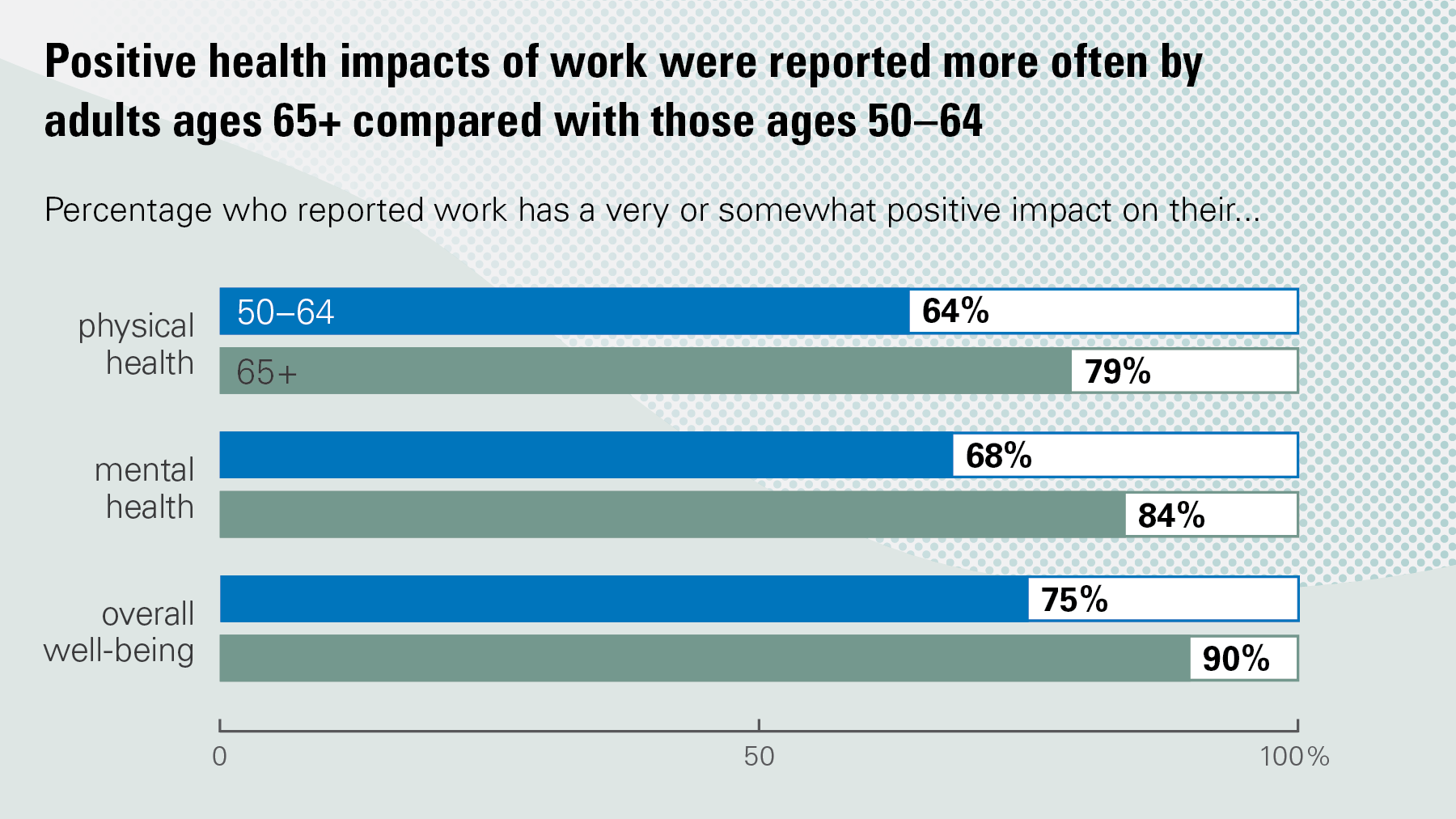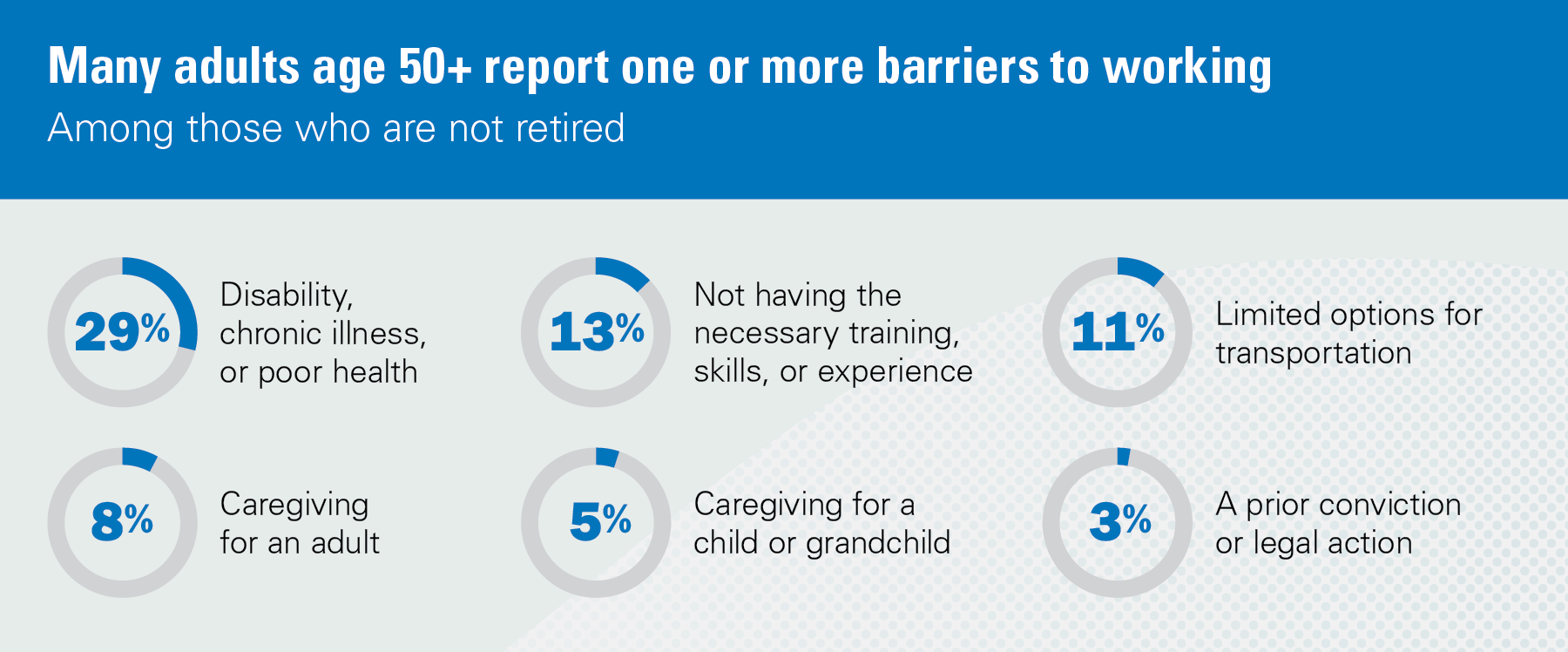
Key Findings
- Working adults age 65 and older reported having more positive experiences with work overall, including positive impacts on health and well-being, compared with working adults age 50-64.
- 39% of adults age 50 and older who are not retired reported experiencing one or more barriers that interfere with their ability to work; the most common barriers were disability, chronic illness, or poor health.
- Older working adults with fair or poor mental health were more likely to say they are unable to get time off for health care appointments compared to those reporting excellent, very good, or good mental health.
Work and health are interconnected: a person’s job can have both positive and negative effects on their overall health and well-being, and health challenges can impact one’s ability to work. As people continue to work later in life, whether by necessity or choice, it is important to explore the connections between work and health among older adults. In August 2024 the University of Michigan National Poll on Healthy Aging asked a national sample of adults age 50 and older about their experiences with work, how work impacts their health and well-being, and their motivations for and barriers to working.
Employment status
Overall, 42% of people age 50 and older reported they are currently working (63% age 50–64 and 18% age 65+). A similar percentage (43%) said they are retired (13% age 50–64 and 78% age 65+), and 15% were not working for another reason (24% age 50–64 and 5% age 65+). Among adults age 50 and older who work, 78% work full-time and 22% work part-time. The majority (83%) work for an employer other than themselves, while 17% are self-employed.

Remote and hybrid work
Among adults age 50 and older who work for an employer, 15% said they work fully remotely / telecommute (do not work at an official worksite on any day), 17% reported working in a hybrid format (do not work at an official worksite some days), and 69% indicated they work fully on-site / in person.
Older adults with higher levels of education (bachelor’s degree or higher) and those with higher household incomes ($60,000 or greater) reported working fully remotely or hybrid more often than older adults with less education or lower income.
How work impacts health and well-being
Physical health
Among working adults age 50 and older, 67% reported that work has a positive impact on their physical health (18% very, 49% somewhat), while 33% said it has a negative impact. Workers age 65 and older were more likely to say work has a very positive impact on their physical health compared with workers age 50–64 (32% vs. 14%). In addition, 71% of workers age 50 and older agreed that working keeps them physically active (27% strongly agreed, 44% agreed).
Mental health
Among adult workers age 50 and older, 71% said work has a positive impact on their mental health (24% very, 47% somewhat), while 29% said it has a negative impact. Workers age 65 and older were more likely to say work has a very positive impact on their mental health compared with workers age 50–64 (41% vs. 20%).
Overall well-being
Among working adults age 50 and older, 78% said work has a positive impact on their overall well-being (24% very, 54% somewhat), while 22% said it has a negative impact. People age 65 and older were more likely to report that work has a very positive impact on their overall well-being compared with working adults age 50–64 (39% vs. 21%).
Health care appointments
Most workers age 50 and older (92%) agreed they can take time off from work for health care appointments. However, compared with those reporting excellent, very good, or good mental health, older adults who reported fair or poor mental health were more likely to indicate they are unable to take time off from work for such appointments (22% vs. 7%).
Reasons for working
Working adults age 50 and older commonly reported these reasons for working as being very important:
- Have financial stability (78%)
- Save for retirement (65%)
- Get access to health insurance (59%)
- Support family members financially (52%)
- Maximize Social Security benefits (46%)
- Have a sense of purpose (46%)
- Contribute to society (26%)

Benefits of working
Many workers age 50 and older strongly agreed that work:
- Keeps their brain sharp (46%)
- Maintains social connections (30%)
- Helps them stay focused (30%)
- Gives them an opportunity to learn new skills (27%)
Workers age 65 and older were more likely than workers age 50–64 to strongly agree that work keeps their brain sharp (57% vs. 43%), helps maintain social connections (37% vs. 28%), and helps them stay focused (40% vs. 28%).
Job satisfaction and feeling valued
Overall, 88% of workers age 50 and older said they feel satisfied with their job (45% very, 43% somewhat).
Among adults age 50 and older who work for an employer, the majority reported feeling valued by their co-workers (48% a lot, 42% somewhat), supervisor (47% a lot, 37% somewhat), and employer (36% a lot, 41% somewhat). Workers age 65 and older were more likely than workers age 50–64 to report feeling valued by their employer (84% vs. 75%).
Barriers to working and work-related concerns
Among adults age 50 and older who are not retired, 39% reported experiencing one or more of the following barriers that interfered with their ability to work:
- Disability, chronic illness, or poor health (29%)
- Not having the necessary training, skills, or
experience (13%) - Limited options for transportation (11%)
- Caregiving for an adult (8%)
- Caregiving for a child or grandchild (5%)
- A prior conviction or legal action (3%)
Notably, adults age 50–64 more often reported barriers to working compared with those age 65 and older (41% vs. 30%).
Barriers to working also differed by employment status. Older adults not currently working were much more likely to experience one or more barriers that interfere with work compared with those working (83% vs. 23%).
In addition, we asked about work-related experiences among all those who had worked in the past five years regardless of their current work status. Overall, 26% thought their skills were not being fully utilized, 25% said the pay was too low to be worth their time, and 20% said their health insurance did not cover their needs or cost too much. In addition, 13% felt their job was too physically demanding, and 11% said they experienced age discrimination at work.
Implications
People age 50 and older make important contributions to the workforce. These poll findings
show that many adults age 50 and older are working, including nearly 20% of adults age 65 and older. While financial stability and other economic motivations are typically the most important reasons for working, older workers also recognized many other positive impacts of working, including feeling satisfied with their job and having a sense of purpose.
For older workers who want or need to work, and are able, working can offer important benefits to their overall health. In this poll, the majority of working adults age 50 and older said work has a positive impact on their physical health, mental health, and overall well-being. Moreover, many older adults who were working strongly agreed that work helps keep their brain sharp and that it fosters social connections.
However, there were important differences in work experiences by age. Overall, working adults age 65 and older reported more positive experiences, including positive impacts on health and well-being, than working adults ages 50–64. Workers age 65 and older more often reported feeling valued by their employers and less often reported barriers to working compared with workers age 50–64.
Not all jobs offer flexibility, including the ability to take time off for health care appointments. Notably, workers with fair or poor mental health more often reported challenges with taking time off work to attend medical appointments. These individuals may experience worsening health conditions and need to miss more workdays, adversely affecting their overall well-being and work productivity. Ultimately, some workers experiencing health challenges may be forced to reduce their working hours or leave the workforce entirely.
Several barriers interfere with non-retired older adults’ ability to work. The most common barriers to working were disability, chronic illness, or poor health. Health care providers should ask older patients about their employment and any connection between work and their health with the goal of optimizing both when discussing approaches to health promotion and treatment.
Taken together, these poll findings suggest that employers have an important role in recognizing the contributions and supporting the needs of older workers. For example, employers can help older adults feel engaged and valued in the workplace by fully utilizing older adults’ skills and implementing policies and programs that help people continue to work across ages and life stages and support physical and mental well-being. In addition, it is vital for employers to offer flexible work arrangements for employees whenever possible, especially for attending health care appointments and providing care for loved ones. Employers can also facilitate skills trainings to help workers stay competitive in the job market and flourish as their experience and needs evolve.
Data Source and Methods
This National Poll on Healthy Aging report presents findings from a national household survey conducted exclusively by NORC at the University of Chicago for the University of Michigan’s Institute for Healthcare Policy and Innovation. This survey module was administered online and by phone from August 5th – 27th, 2024, to a randomly selected, stratified group of U.S. adults age 50–94 (n=3,486), with an oversample of non-Hispanic Black, Hispanic, and Asian American and Pacific Islander populations. The survey completion rate was 36% among panel members invited to participate. The margin of error is +/– 1 to 4 percentage points for questions asked of the full sample and higher among subgroups.
Findings from the National Poll on Healthy Aging do not represent the opinions of the University of Michigan. The University of Michigan reserves all rights over this material.
For interactive data tables, see https://michmed.org/geZ3B
Citation
National Poll on Healthy Aging Team. The Intersection of Work, Health, and Well-Being. University of Michigan National Poll on Healthy Aging. January/February 2025. Available at https://dx.doi.org/10.7302/25186